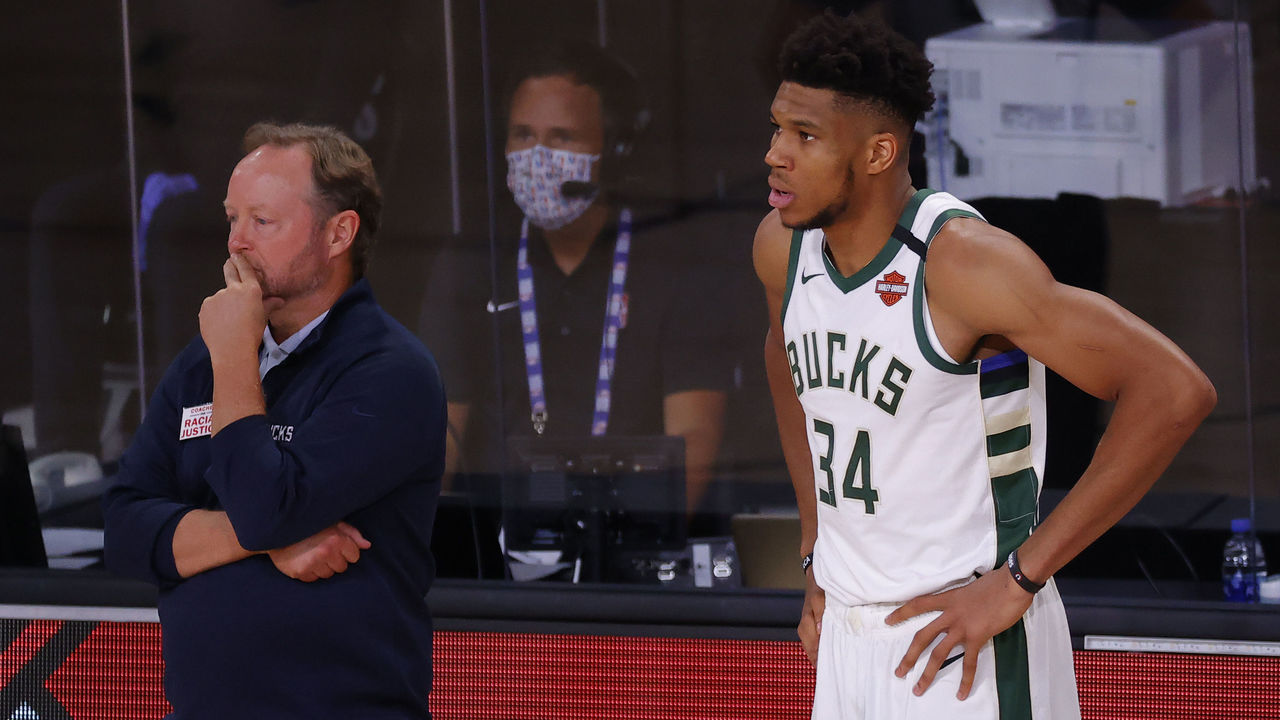Whose stock dropped most during the NBA playoffs?
We've witnessed numerous key players and coaches fall well short of expectations so far during these highly irregular 2020 NBA playoffs.
Here are five individuals who saw their stock drop most during the postseason.
Doc Rivers

After failing to lead the championship-aspiring Los Angeles Clippers to their first conference finals appearance, Rivers stepped down as head coach.
Rivers' latest playoff disappointment ended with L.A. squandering a 3-1 series lead to the Denver Nuggets. In seven seasons as the team's bench boss, the 58-year-old failed to progress past the second round.
Fortunately for Rivers, he wasn't without a team for long as his move to the Philadelphia 76ers was made official Saturday. However, there's no denying his failure to get the most out of the Clippers during these playoffs has hurt his stock, and all eyes will be on the head coach when the 76ers next make the postseason.
Paul George
Speaking of the underwhelming Clippers, no player on the roster disappointed more than George. The California native struggled mightily to consistently produce throughout the playoffs while serving in a complementary role next to Kawhi Leonard.
The six-time All-Star shot an uncharacteristically low 39.8% from the field and 33.3% from distance across 13 postseason games. George scored 15 or fewer points in six of those contests, including an abysmal 10-point performance on 4-of-16 shooting in Los Angeles' Game 7 loss to Denver in the conference semifinals.
Many have placed George among the game's elite talents for years. But after a hot-and-cold postseason, one has to ask whether the 30-year-old truly belongs in the NBA's superstar tier.
Pascal Siakam

Siakam looked like a shell of the All-NBA talent Raptors fans have grown accustomed to once he entered the league's bubble at Disney World. The Cameroonian's scoring and efficiency cratered, leading to an overall dip of nearly seven points per game from his pre-bubble numbers.
| GP | PTS | FG% | 3P% | FT% | REB | AST | STL | BLK | DD | |
|---|---|---|---|---|---|---|---|---|---|---|
| Pre-bubble | 53 | 23.6 | 45.9 | 35.9 | 80.0 | 7.5 | 3.6 | 1.0 | 0.9 | 12 |
| Post-bubble | 18 | 16.9 | 39.5 | 26.5 | 71.6 | 6.8 | 3.2 | 1.1 | 0.4 | 4 |
Toronto regularly leaned on Siakam to produce as its No. 1 option, especially in the Eastern Conference semifinals against the Boston Celtics. Unfortunately for the Raptors, he managed to score more than 20 points just once in the seven games and connected on only four of his 32 long-range attempts.
The Raptors will hope Siakam's struggles in the bubble prove to be a minor speed bump on his otherwise incredible journey to stardom. How well the forward can recover from this setback in the first year of his new max contract will go a long way in determining the team's ceiling next season.
Mike Budenholzer

For a second straight year, the Milwaukee Bucks were unable to carry their dominant regular-season performance into the playoffs, a failure that falls mainly on head coach Mike Budenholzer's shoulders.
Milwaukee was far from the juggernaut we expected it to be in Orlando. A sub-.500 run during the seeding games was more than a blip on the radar, as the Bucks couldn't right the ship in the playoffs.
| Record | Off. Rating | Def. Rating | Net Rating | |
|---|---|---|---|---|
| Before bubble | 53-12 | 112.3 | 101.6 | 10.7 |
| Inside bubble | 3-5 | 109.4 | 110.2 | -0.8 |
| Playoffs | 5-5 | 109.1 | 107.3 | 1.8 |
Budenholzer has a history of guiding teams to overwhelming regular-season success only to falter when the games carry more weight. The Bucks looked poised to reach the Finals last season after they had won 10 of their first 11 playoff games, but they proceeded to drop four consecutive contests to the eventual champion Raptors in the East finals. He also oversaw a 60-win Atlanta Hawks team in 2014-15 that was swept by the Cleveland Cavaliers in the conference finals.
There's no question that Bud pushes the right buttons to maximize his team's production during marathon regular seasons, but his inability to make the necessary adjustments in the postseason continues to negatively impact his reputation.
Russell Westbrook

The Houston Rockets made a franchise-altering decision when they acquired Westbrook from the Oklahoma City Thunder in exchange for Chris Paul. Westbrook and James Harden formed one of the league's most athletic backcourts on paper, one that the Rockets hoped would carry them all the way to an NBA title.
Season 1 of the Westbrook-Harden experiment wound up producing underwhelming results, though, largely due to the former's playoff production.
Westbrook - who promised to improve his shooting after being eliminated in the first round last season - converted just 24.2% of his 3-point attempts during the playoffs after shooting only 25.8% from deep in the regular season. He also produced a pair of 10-point duds in the Rockets' second-round matchup against the Lakers, a series that Los Angeles won handily in five games.
The UCLA product has always compensated for his below-average jumper by relentlessly attacking the rim, which the Rockets tried to maximize through a radical commitment to small-ball lineups. The decision opened up more driving lanes for Westbrook to utilize, and while the results were promising during the regular season, the setup wasn't nearly enough to get Houston over the hump.
If a team that bases a sizable part of its offense on Westbrook's primary skill set can't unlock the best of his game, one has to wonder if a roster featuring the 2018 MVP is actually capable of winning a championship.